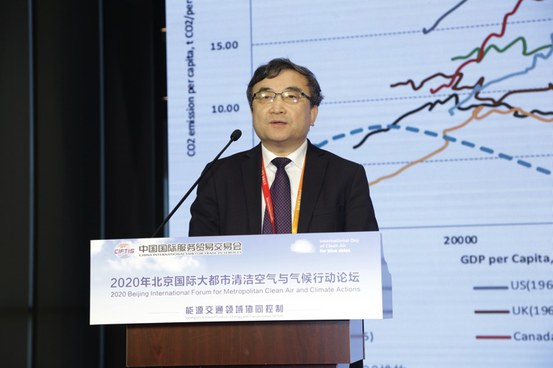Forum Explored How to Build Clean and Low Carbon Metropolises

Picture courtesy: Beijing Municipal Ecology and Environment Bureau
Supported by Energy Foundation China (EF China), Beijing’s Municipal Research Institute of Environmental Protection, a policy think tank overseen by the city’s Ecology and Environment Bureau, hosted the Fourth International Forum for Metropolitan Clean Air and Climate Actions in Beijing in early September, on the sidelines of the 2020 China International Fair for Trade in Services.
Focused on the co-control of air pollutant and GHG emissions in energy and transportation sectors, the forum invited representatives from China’s Ministry of Ecology and Environment (MEE), the United Nations Environment Programme, environmental regulators of the Beijing-Tianjin-Hebei region and those from California, Paris, Tokyo, Seoul, Hong Kong, and other international cities, and experts on air quality and climate change from Tsinghua, Peking, and other universities and research institutes, who shared their plans, policy tools, measures, and actions for coordinated air quality and climate goals.
According to LI Gao, Director-General of MEE’s Department of Climate Change, by 2019, China’s carbon intensity had been down by 48.1 percent from 2005 and the share of non-fossil energy in primary energy consumption had climbed to 15.3 percent—both had surpassed China’s targets for 2020. China will unswervingly push forward its national strategy of actively tackling climate change, promote climate responses with greater resolution and efforts, and use climate actions to drive high-quality economic development and environmental protection, despite the uncertainties regarding global climate governance amid the pandemic, he said.
ZHANG Dawei, Deputy Director-General of MEE’s Department of Atmospheric Environment, shared the ministry’s initial plan for air quality improvement during the 14th Five-Year Plan period in five aspects: regulation, comprehensive emissions reductions, technical support, innovative oversight tools, and public participation.
ZOU Ji, President and CEO of EF China, said in his keynote speech that China had begun to decouple its economic growth from pollution. The COVID-19 pandemic itself would not bring continuous reductions in pollutant and GHG emissions, he argued, and China should combine immediate stimulus actions with long-term development goals when formulating economic recovery plans, in particular, preventing new financial risks and excessive production capacity to avoid high-carbon lock-ins. Beijing, as the capital, should showcase a low carbon transition that brings people amenity, clean air, and clear water, which will in turn makes the city more attractive in the eyes of investors, he said. “As for carbon emissions reductions and air pollution control, we believe Beijing should formulate its long-term strategy for zero emissions, set the goal during the 14th Five Year Plan period of attaining world-class PM2.5 and ozone standards, and make the best of the Winter Olympics to drive innovation in energy, transportation, environmental protection, and the economy.”
EF China also helped invite leading international experts to attend the forum, including Alex Wang, Professor of Law at the School of Law of the University of California, Los Angeles; Jack Broadbent, Chief Executive Officer/Air Pollution Control Officer of the Bay Area Air Quality Management District, California; Jeremy Schreifels, Visiting Fellow at Resources for the Future; and Robert Weisenmiller, Former Chair of the California Energy Commission. They shared legal and policy experiences from California and other places in the co-management of air and climate issues in power generation, energy storage, and other fields.




